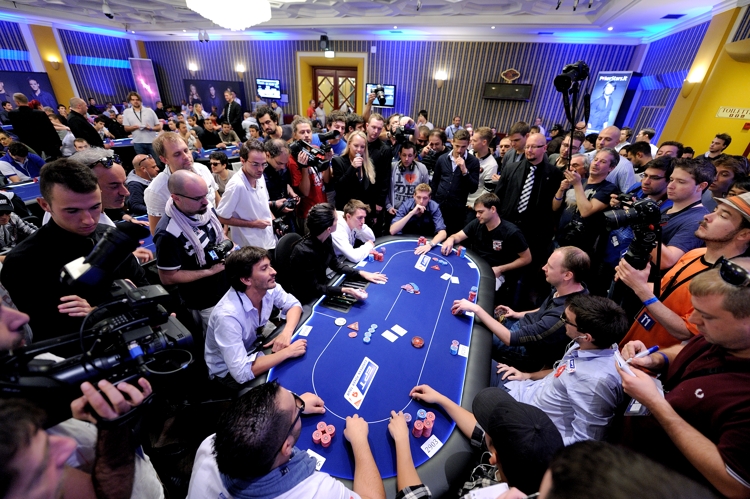Late Stage Poker Tournament Strategy
- The late stage of the tournament can be defined as the period leading up to the money bubble and after the money bubble up until the final table. Exactly how long the period before the bubble will vary from tournament to tournament, but in general it will be from whenever there is a change in play from a number of players to being more.
- Joseph Hebert won the ‘Domestic Tournament’ of the 2020 World Series of Poker $10,000 buy-in no-limit hold’em main event Monday evening in Las Vegas. The 38-year-old poker player and part.
The late stages of a tournament call for a solid mix of luck and skill. You can’t possibly advance without one or the other, but there is just about nothing you can do to control just how lucky you might get. The late stages of a tournament are the primary reason why tournaments have so much variance. You can play perfect poker for 10 tournaments in a row and never end up with anything better than a min cash.
Late Stage Poker Tournament Strategy Games
How To Win Online Poker TournamentsStage. This is part 3 of online.

Nothing is more frustrating than making a deep run only to bust out in the late stages because you lost a few coin flips that you had no control over. Ask any past World Series of Poker Main Event final tableist how they got there. The odds are that they will say that they got very lucky. Ask those same players how they busted out and they may very well tell you that they got a little unlucky. This is just how tournament poker works, for better or worse.
Of course, nothing is more exhilarating or fun than being able to put together a good run that is aided by some good luck. The late stages of tournaments are as close to pure gambling as poker gets. There isn’t a whole lot you can do to control your own fate if the poker gods have other plans, so you may very well have to flip a number of coins and hope for the best. How about that for poker tournament strategy?
While there is an obvious amount of luck involved in tournament play, it does not mean that all skill is void and useless. The truth is that there are a lot of skills required for successful late stage tournament play. The skills are more about identifying certain situations than they are about making complicated or intricate plays.
For example, you aren’t going to worry about making a triple barrel or check raising on the flop, but you will need to know when you should be going all in and when you should be folding. This is what is widely known as push fold strategy. Going all in or folding become your only two options because your chip stack will be very small in comparison to the blinds. You can’t possibly afford to make plays when you only have a handful of big blinds to work with, let alone expect them to pay off. You have to play with a fearless attitude in the later stages of tournaments. Where passiveness and selective aggression is all the rage in the beginning and middle stages of tournaments, it will be deadly to your chances of survival as you move into the later stages.

Before the Final Table
The late stages of a tournament are well after you have already made the money, so the next logical step is to prepare for the final table. You should be ready and willing to take chances that will put you in position to actually win the tournament. There is no space for unnecessary risks, but it is OK to flip a coin for a chance at winning.
The problem with this approach is that you never want to actually risk everything on the flip of a coin. You should be trying to create significant edges, 65/35, 75/25, etc., and be happy if you end up getting in a few flips. There is a major difference between aiming for coin flips and winding up in a coin flip. In the end, coin flips should be a worst case scenario when you decide to make a big play. If you get your money in worse than you had expected, and are still even money, there is no reason to be all that upset.
Blinds Are Important
Late Stage Poker Tournament Strategy

The blinds are initially in place to help pick up the pace and to force players to get involved, but when the blinds equate to 10% of your stack in the later stages of a tournament, they are very well worth fighting for. Your stack could be 200,000 and you could be playing with the blinds at 10,000/20,000. This will mean that a simple blind steal will increase your stack by around 15%. Steal a few sets of blinds and you are suddenly 50% richer.
Advanced tournament players are able to consistently pick off the blinds in an attempt to really build up their stack. This isn’t a risk free way to go about winning pots and increasing your equity, but it is safer than going all in and hoping for folds all around. The general rules for stealing the blinds will still apply. Look for late position steals against tight players. These are the types of plays that will actually work, whereas steal attempts from middle position against loose players in the blinds will fail at a fairly high clip. Stealing blinds is a valuable way to accumulate chips and it could decide whether you run over your opponents or have your stack melted away.

Close Out the Win with Late Stage Tournament Strategy
Written by Haunted Poker for exclusive use.
First of all, congratulations on making it to this point in the tournament. You’ve outlasted a good number of opponents, and you’re in the money. At this point, you need to make a push for the final table and eventually first prize. What you do at this point will largely depend on the size of your chip stack in comparison to the blinds, and the type of players at your table. Generally, you should take advantage of your chip lead by putting pressure on the short stacks and if you are the short stack, you should be looking for the best opportunity to shove it all in.
As the tournament winds down and players fight for higher positions in the payout ladder, the blinds usually become astronomical. Not only is this the case with small-stakes online poker tournaments, but it is becoming increasingly standard in casino events as well. This low number of chips in play in relation to the size of the blinds increases the luck element of the game, as it forces players to gamble on hands that they wouldn’t normally incorporate into their strategy.
At all times, you should be aware of how many rounds of blinds you’ll be to able play before you go broke. If you have 4,000 chips left and the blinds are 500/1,000 you’re in a dangerous situation. You can only play 2 or 3 more rounds without improving your chip count. Whenever you’re down to 5 or 6 or less times the big blind, you should be looking for opportunities to go all-in.
You can’t wait much longer for a couple of reasons. Firstly, you want to have enough left to put pressure on your opponents with your all-in. If they all fold to you preflop, you’ve bought yourself another round of play. Secondly, if you just call, you won’t have much left on the flop and you’ll be faced with a tough decision if you don’t connect. Since you’ll already be committed to the pot, save yourself the trouble and go all-in – you won’t have to make any more decisions in the hand. Hands you should consider going all-in with include any pocket pair, a decent Ace, King, or two face cards. Even suited connectors aren’t big underdogs to overcards, so consider making a move. The key is to be aggressive and put pressure on the rest of the table when you’re the short stack.
However, what if you find yourself in the fortunate position of being the chip leader or one of the bigger stacks left in the tourney? You shouldn’t sit back and rely on those chips to coast you to the final table. You’re playing to win, so keep building your stack and allow yourself to remain aggressive. Because you have so many chips, you can afford to gamble a bit with some of the shorter stacks. In tournaments, drawing to straights and flushes too often usually spells disaster. However, I recommend that you bet aggressively when you pick up a draw as a chip leader. If you’re heads-up on the flop and you greatly outnumber your opponent in chips, consider putting him all in with middle pair or a draw. He’ll have to have a very strong hand to risk his tournament life, and most of the time you’ll pick up the pot with your large bet.
Also, you can call all-in gambles from short stacks if you have any pocket pair and you suspect they have something like A-K. You can afford to lose those coin-flip hands, but you’ll be in great position if you come out ahead. The worst thing you can do with a chip lead is to sit on it and allow the blinds to peck away at you. Maintain your lead and at least pick up the blinds every round if possible.
As you work your way to the final table, play usually becomes increasingly sophisticated and tight. If the rest of the table won’t put any chips into the pot and everyone is too timid to risk going out before the final table, punish them. Throw in big raises preflop against weak opponents until someone fights back. Reaching the final table is an imaginary boundary, and since you’re playing to win the whole thing why not exploit their timid play and pick up a few extra blinds?
Once you do reach the final table, you can probably advance a few places just by allowing the maniacs to do their bidding. Many players are content with their final table finish, and will get “chip happy” for a couple of rounds. As the table becomes shorthanded, you should realize that starting hands go way up in value, and you’ll need to play your opponents more than your cards. With less opponents left at the table, the blinds will be coming around much faster.
Now more than ever, you’ll need to open up your play, steal the blinds at opportune times, and look for weaknesses in your opponents. You might consider slowplaying your monster hands, as it is more unlikely that you will be outdrawn in shorthanded play. Study your opponents and the cards they show since you’ll be seeing them in almost every pot. Finally, if you make it to heads-up play, you’ll have to stay aggressive and raise most hands from the small blind to take control. Don’t be afraid to get all your chips in the pot with any Ace, a decent King, face cards, or any pocket pair. The end of the tournament is all about maintaining your chip lead and taking risks when you need to. Exploit a tight table, wait for stronger cards at a looser table, and never reserve yourself to anything less than first prize. My my, you didn’t think that vampires could be so competitive, did you?

-Why Wait? Pacific Poker is offering our players a 25% instant cash bonus. |